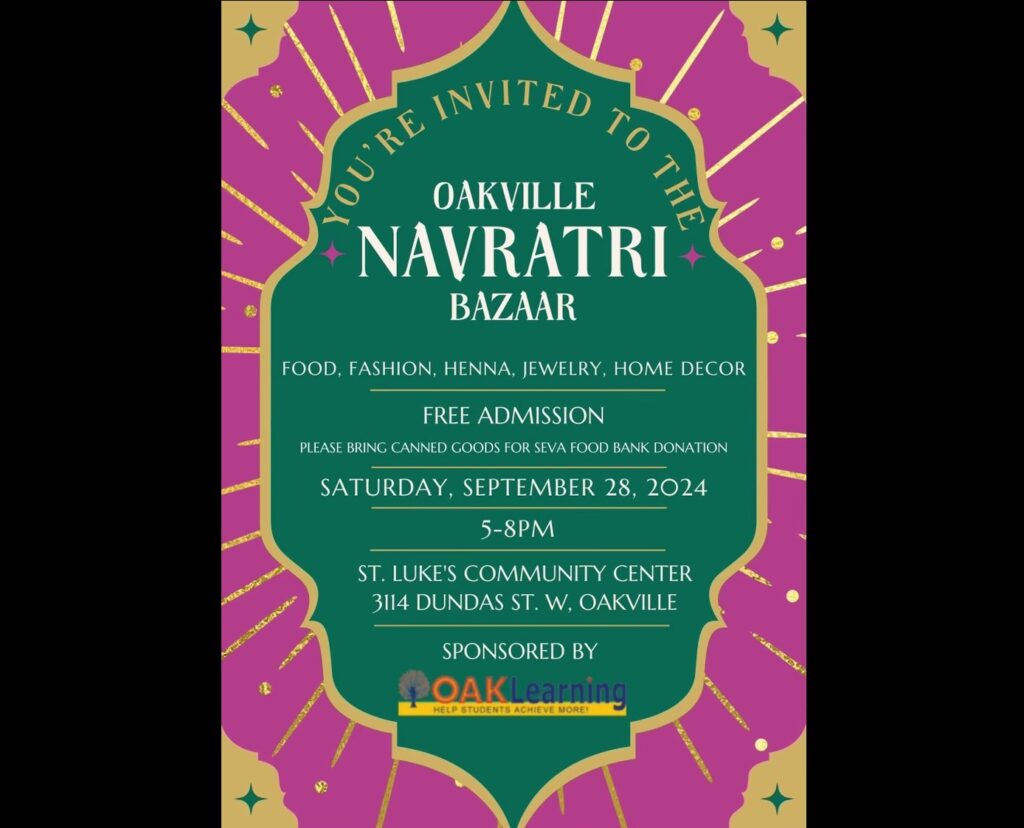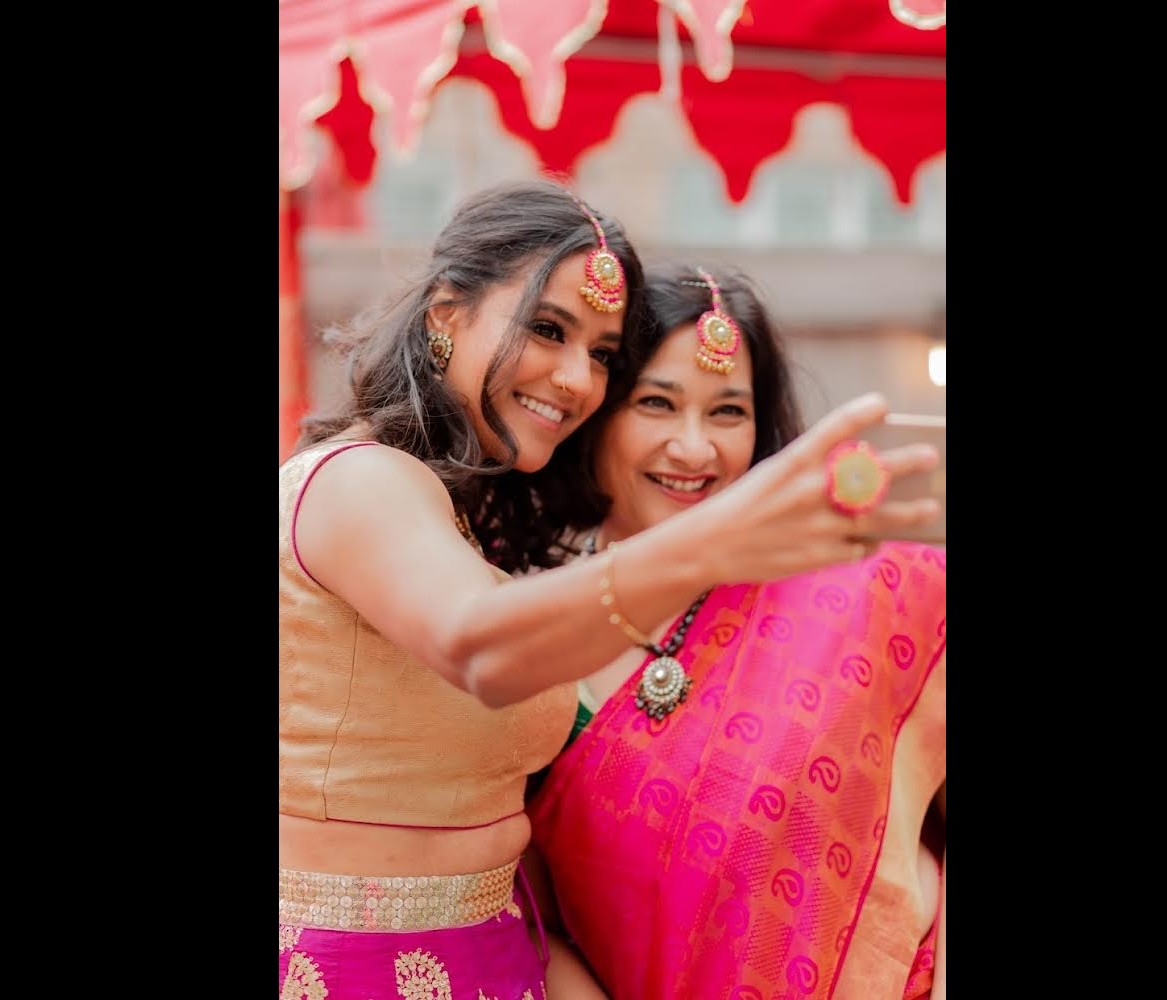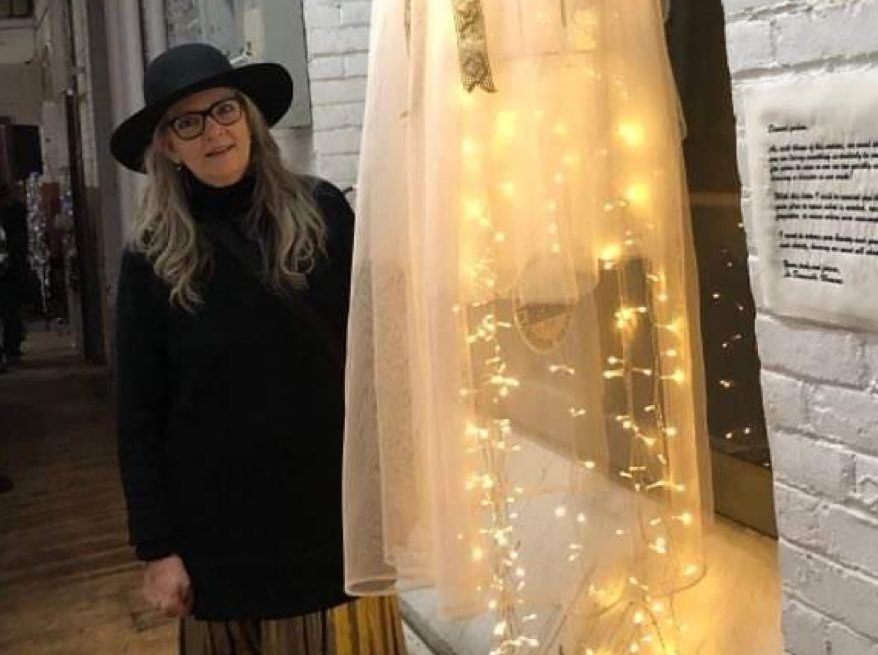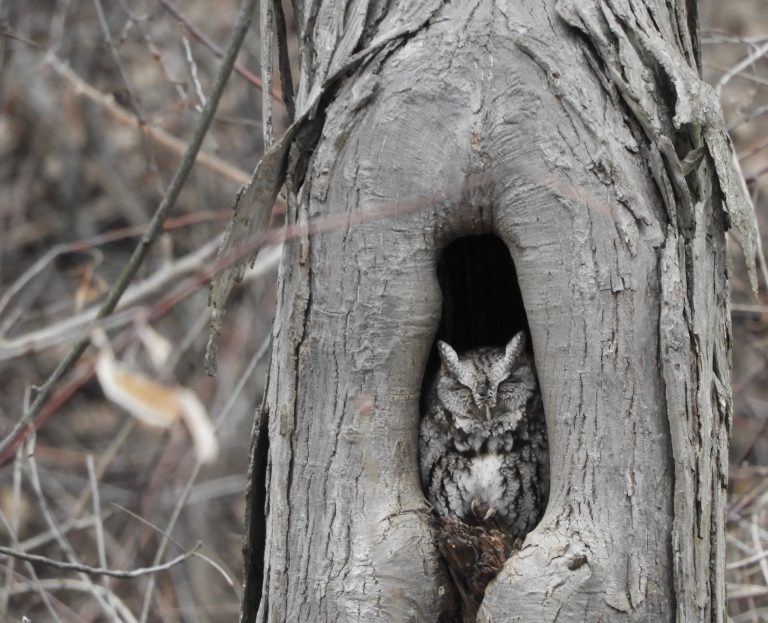By Sydney Alexandra, Local Journalism Initiative Reporter
For Sita Jayaraman and her daughter Tarini Sharma, organizing the annual Navratri Bazaar in Oakville goes beyond celebrating their South Asian heritage. It’s an invitation to the entire Halton community to gather, experience South Asian traditions, and form a deeper connection to culture and community. What began as a personal reflection on their roots has blossomed into an inclusive event that allows local entrepreneurs and families to celebrate while contributing to a vibrant, supportive environment.
Navratri is a nine-day Hindu festival that honours the goddess Durga, a symbol of strength, wisdom, and resilience. Communities come together to celebrate the divine feminine through music, dance, and devotion. While many are familiar with Diwali, the festival of lights that follows Navratri, Jayaraman and Sharma believe the build-up to Diwali is equally important in terms of spiritual significance and the reaffirmation of cultural traditions.
For Jayaraman, this connection to Navratri runs deep. “As a child, I always looked forward to Navratri,” she recalls. “My mother and I would visit homes in our community in India, singing, chatting, and sharing treats. I loved dressing up and being part of that experience. When I moved to Canada, I thought, ‘Why am I not doing this here?’”
That simple question led to action. Fifteen years later, Jayaraman and Sharma organized their first Navratri celebration in Canada. Since then, it has evolved into an annual gathering that invites everyone in Halton to experience the joy of Navratri. It has become a space for families to reconnect with their roots while introducing non-South Asians to the beauty and richness of these traditions.
At the heart of Navratri lies the story of Durga, a powerful goddess who embodies the triumph of good over evil. According to the legend, the demon Mahishasura wreaked havoc and terrorized the heavens and earth, defeating anyone who challenged him. In response, the gods united their divine energies to create Durga, a fierce warrior with the strength of all the deities combined. Over nine days, she battled Mahishasura, and on the tenth day, she emerged victorious, symbolizing the triumph of righteousness.
“For us, Durga represents not just power but also wisdom and nurturing,” Sharma explains. “She embodies the strength women possess — the strength to fight for justice, the wisdom to guide, and the ability to nurture our families and communities.”
Jayaraman adds, “Durga’s story is a reminder that we all have the power to overcome challenges. As women, we can draw inspiration from her courage and resilience. This is what we celebrate during Navratri — the feminine divine and the myriad ways women express strength in their lives.”
It is the qualities that Durga represents, that strength, alongside wisdom and independence that resonate deeply with both mother and daughter.
“I’ve always been drawn to Durga,” says Sharma. “She’s a feminist icon in so many ways — fearless, wise, independent, and strong. She’s someone who isn’t afraid to face challenges head-on, and that’s something that resonates with me, especially as a young South Asian woman.”
For Jayaraman, Durga’s influence is even more personal. “I was so inspired by her that I named my daughter ‘Tarini,’ which is another name for the goddess Durga,” Jayaraman shares. “Durga embodies everything we celebrate about women — their strength, resilience, and ability to nurture. Through this festival, we’re honouring those qualities in every woman.”
However, the journey to embracing their cultural heritage hasn’t always been easy for Sharma. Growing up in Oakville, she often felt disconnected from her South Asian roots.
“There weren’t a lot of South Asian kids in my school, especially in elementary school,” she recalls. “When I got to high school, there were more, but there still wasn’t much South Asian representation. You didn’t really see events like Navratri being talked about.”
As a result, Sharma felt the pressure to assimilate. “I didn’t talk much about my culture,” she admits. “I didn’t wear traditional clothing or celebrate cultural events outside of my family. It wasn’t until I went to university that I started reconnecting with my heritage. That’s when I began to bridge my South Asian roots with my Canadian upbringing.”
Sharma hopes to create a space where young people feel proud of their cultural identity. “I want kids growing up in non-diverse areas to know it’s okay to celebrate who they are,” she says. “Assimilation is a normal response when you’re trying to fit in, but your culture will always be there for you. You can come back to it in any way that feels right — through food, music, clothing, or celebration. It’s about reclaiming your identity on your own terms.”
Beyond celebrating culture, the Navratri Bazaar also serves as a platform to empower women and support local businesses. Many vendors at the event are South Asian women who run small businesses from their homes, often while managing many responsibilities.
“A lot of local South Asian businesses are run by women,” explains Sharma. “Many of them don’t have the resources to turn their businesses into full-time operations. It’s often a side hustle — they’re cooking from their kitchens, crafting at home, and selling products on the side.”
The Bazaar offers more than just a place to sell products; it’s about building autonomy for these women. Sharma notes that some business owners, especially newcomers to Canada, may rely on their families or partners for logistical support. “This event allows them to take control of their businesses and share their skills with the community. It’s about creating opportunities for these women to showcase their talents and gain financial independence.”
Jayaraman, who also works as the Manager of Human Rights and Equity at the Halton Catholic District School Board, sees the Bazaar as an extension of her professional work. “The essence of human rights is recognizing the dignity of every individual and creating spaces where people feel seen, heard, and respected. That’s what we aim to do with this event,” she explains. “We provide a space for people to celebrate who they are — their culture, their identity — in a way that isn’t always part of mainstream Canadian celebrations.”
Jayaraman and Sharma emphasize that the Navratri Bazaar is not just for the South Asian community but for everyone. “We’ve opened it up to the entire community,” Jayaraman says. “We’ve had people from all backgrounds come to enjoy the food, music, and henna. It’s not just for South Asians — it’s for anyone who wants to be part of something joyful and inclusive.”
Ultimately, the Navratri Bazaar is about more than celebrating a festival — it’s about building bridges between cultures, supporting local businesses, and creating a space where everyone feels welcome.
“This is a celebration of community,” says Sharma. “We want people to come, enjoy, and take away something meaningful — whether it’s a new understanding of South Asian culture, a connection to a local business, or simply the joy of being part of something bigger than themselves.”
This year’s Navratri Bazaar will take place on Saturday, September 28, at Saint Luke’s Community Centre in Oakville from 5:00 p.m. to 8:00 p.m. Admission is free, though Sharma and Jayaraman request that people bring a donation for Seva Food Bank. Attendees can expect a wide array of vendors selling food, jewelry, clothing, and home decor, as well as activities like henna tattoos and tarot card readings. The event offers something for everyone — whether you’re shopping, exploring new traditions, or simply looking to connect with your community.






